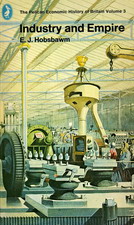
Industry and Empire
The Pelican Economic History of Britian: Volume 3: From 1750 to the Present Day
Hobsbawm, E. J.
Publisher: Penguin Books, Harmondsworth, United Kingdom
Year First Published: 1968
Year Published: 1969
Pages: 384pp Resource Type: Book
Cx Number: CX9461
Hobsbawm documents the rise of the industrial revolution in Britain from its origins around the mid 1700s, its expansion throughout the Victorian decades and finally its effects on British society up to the 1960s.
Abstract:
From the middle of the 18th century onwards, the industrial revolution in Great Britain marked a period of unparalleled technological and economic growth. The expansion of overseas markets, the rise of urbanization, mass production and the advent of steam power rapidly altered the landscape and economy of the burgeoning Empire. Focusing on the domestic economic history of Great Britain, E.J Hobsbawm's Industry and Empire documents the rise of the industrial revolution from its origins around the mid 1700s, its expansion throughout the Victorian decades and finally its effects on British society up to the 1960s.
The nineteenth century witnessed the rise of written documentation recording production rates, imports, exports and other valuable consensus data. Hobsbawm harnesses these figures and statistics to provide a thorough background of British economic growth, and in turn, uses the information to present an in-depth perspective on the everyday consequences of the revolution. Industrialization brought changes to nearly every aspect of British life. The author addresses both the economic and social issues brought forth by the rapid reorganization of British society and aims to illuminate the transformation from a predominately agricultural and peasant oriented population to one based on wage labour, socio-political organizations and metropolitan living.
Industry and Empire begins by presenting a background to the origins of the industrial revolution in the 1750s, underlining the necessary social and economic factors essential to the rise of industrial growth. Throughout the following chapters, the author concentrates on several issues relevant to the rapid economic and technological development. Approaching the history from an economic perspective presents Hobsbawm with the opportunity to simultaneously address a multiplicity of concerns. Discussing the impact of the industrial revolution in relation to government, agriculture and society, Hobsbawm weaves underlying economic factors throughout his examination, presenting readers with both a fiscal and social context. Industry and Empire describes the rise of British industrialism, the impact of economic expansion on British life and the complications of a nation racing to modernity. The author draws on a wide range of scholarly resources, displays a keen insight on the importance of this period and ties together two centuries of British economic history based around one of the most crucial turning points in modern history.
[Abstract by William Stevenson]
Table of Contents
Preface
Introduction
1. Britain in 1750
2. Origin of the Industrial Revolution
3. The Industrial Revolution 1780 - 1840
4. The Human results of the Industrial Revolution 1750 - 1850
5. Agriculture 1750 - 1850
6. Industrialization: the Second Phase 1840-95
7. Britain in the World Economy
8. Standards of Living 1850 - 1914
9. The Beginnings of Decline
10. The Land 1850 - 1860
11. Between the Wars
12. Government and Economy
13. The Long Boom
14. Society Since 1914
15. The Other Britain
Conclusion
Diagrams
Further Reading
Index


